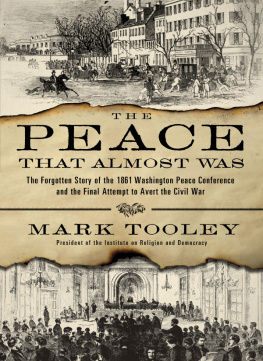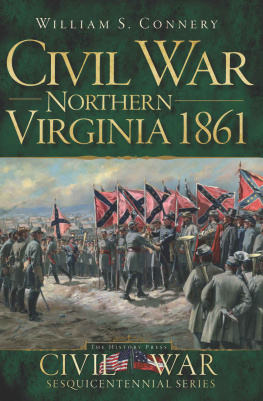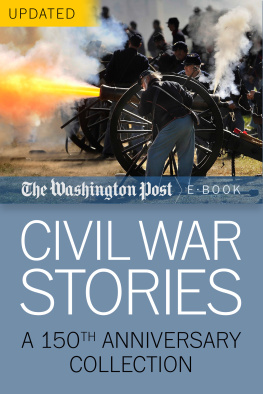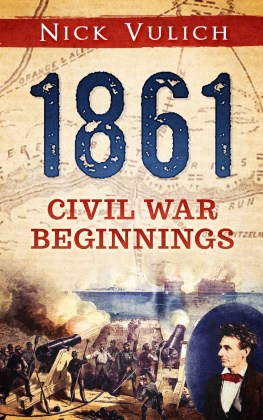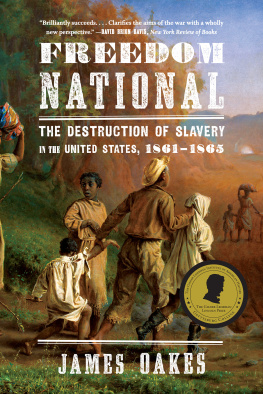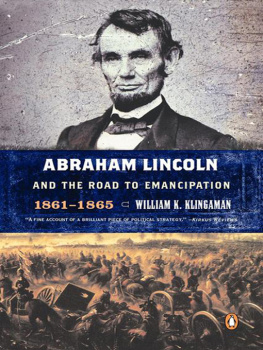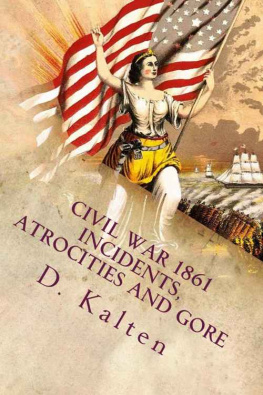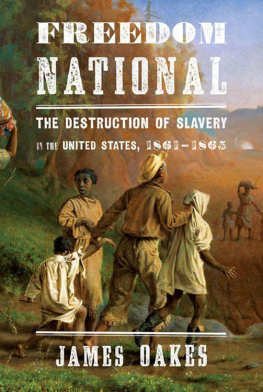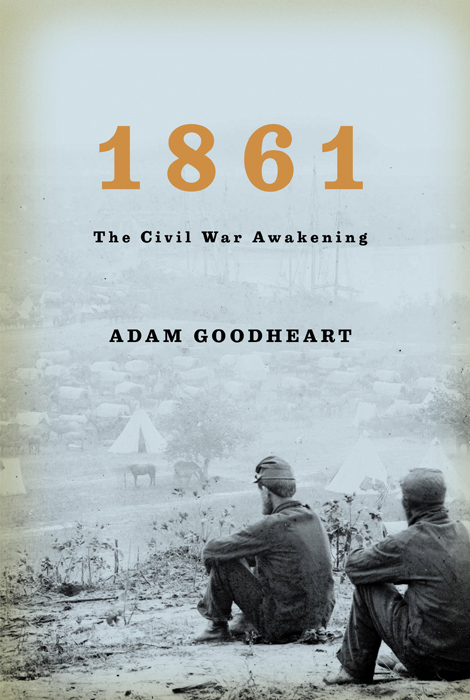This Is a Borzoi Book
Published by Alfred A. Knopf
Copyright 2011 by Adam Goodheart
All rights reserved. Published in the United States by Alfred A. Knopf,
a division of Random House, Inc., New York, and in Canada by
Random House of Canada Limited, Toronto.
www.aaknopf.com
Knopf, Borzoi Books, and the colophon are registered trademarks
of Random House, Inc.
Library of Congress Cataloging-in-Publication Data
Goodheart, Adam.
1861 : the Civil War awakening / Adam Goodheart. 1st ed.
p. cm.
Includes index.
eISBN: 978-0-307-59666-6
1. United StatesHistoryCivil War, 18611865 Causes.
2 . United StatesPolitics and government 18611865. 3. United States
Intellectual life 19 th century. I. Title. II. Title: Civil War awakening.
E 459 .G 66 2011
973.711 dc 22 2010051326
Jacket image: Cumberland Landing, Virginia. Federal Encampment
on the Pamunkey River by James F. Gibson, May 1862 (detail).
Courtesy of the Library of Congress, Washington, D.C.
Jacket design by Joe Montgomery
v3.1
For my family
and in memory of
Rose Sudman Goodheart
(Teleneshty, Russian Empire, 1905Philadelphia, Pennsylvania, 1997),
who made Americas history ours, too.
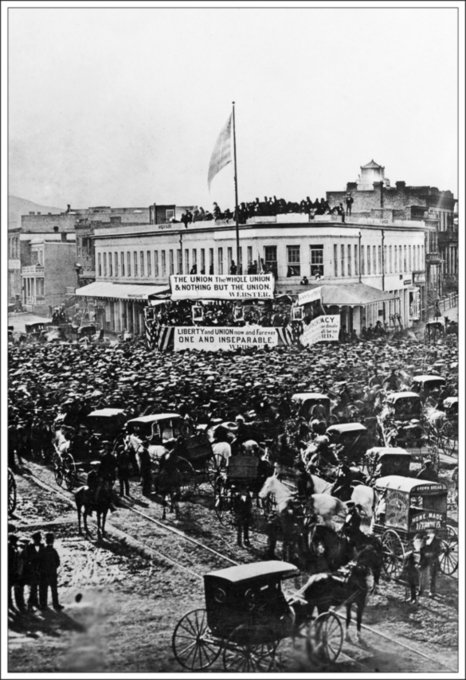
Union rally, San Francisco, 1861 ()
ARMD year! year of the struggle!
No dainty rhymes or sentimental love verses for you, terrible year!
Not you as some pale poetling, seated at a desk, lisping cadenzas piano;
But as a strong man, erect, clothed in blue clothes, advancing, carrying a rifle on your shoulder,
With well-gristled body and sunburnt face and handswith a knife in the belt at your side,
As I heard you shouting loudyour sonorous voice ringing across the continent;
Your masculine voice, O year, as rising amid the great cities,
Amid the men of Manhattan I saw you, as one of the workmen, the dwellers in Manhattan;
Or with large steps crossing the prairies out of Illinois and Indiana,
Rapidly crossing the West with springy gait, and descending the Alleghanies;
Or down from the great lakes, or in Pennsylvania, or on deck along the Ohio river;
Or southward along the Tennessee or Cumberland rivers, or at Chattanooga on the mountain top,
Saw I your gait and saw I your sinewy limbs, clothed in blue, bearing weapons, robust year;
Heard your determind voice, launchd forth again and again;
Year that suddenly sang by the mouths of the round-lippd cannon,
I repeat you, hurrying, crashing, sad, distracted year.
W ALT W HITMAN , 1861
It seems as if we were never alive till now; never had a country till now.
A YOUNG WOMAN IN NEW YORK WRITING
TO A FRIEND , M AY 1861
C ONTENTS
P ROLOGUE
A Banner at Daybreak
Charleston Harbor, December 1860
C HAPTER O NE
Wide Awake
Boston, October 1860
C HAPTER T WO
The Old Gentlemen
Washington, January 1861
C HAPTER T HREE
Forces of Nature
Central Ohio, February 1861
C HAPTER F OUR
A Shot in the Dark
Charleston Harbor, April 1861
C HAPTER F IVE
The Volunteer
Lower Manhattan, April 1861
C HAPTER S IX
Gateways to the West
Lower Carson River, Nevada Territory, May 1861
C HAPTER S EVEN
The Crossing
Washington, May 1861
C HAPTER E IGHT
Freedoms Fortress
Hampton Roads, Virginia, May 1861
C HAPTER N INE
Independence Day
Washington, July 1861
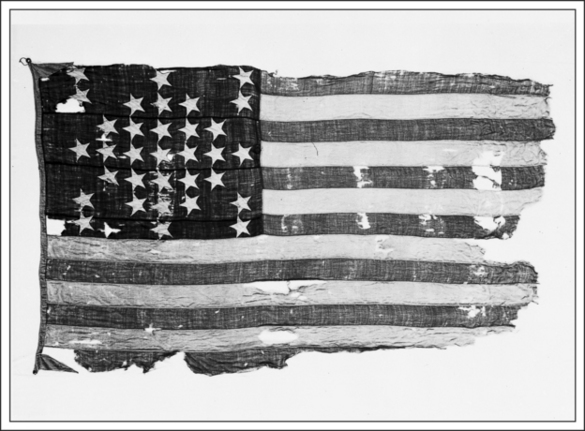
Storm flag of the United States garrison at Forts Moultrie and Sumter, 186061 ()
P ROLOGUE
A Banner at Daybreak
Then over all, (aye! aye!) my little and lengthend pennant shaped like a sword,
Runs swiftly up indicating war and defianceand now the halyards have raisd it,
Side of my banner broad and blue, side of my starry banner,
Discarding peace over all the sea and land.
W ALT W HITMAN ,
Song of the Banner at Day-Break (186061)
Charleston Harbor, December 1860
N IGHT FELL AT LAST. Boats slipped off the beach, swift and almost silent, drawn by skilled oarsmen across the water. The rowers labored hatless and in shirtsleeves, breath visible in the chilly air, blue uniform coats draped over their muskets, concealing the glint of bayonets. Somehow all three of their vessels eluded the patrolling steamers, crossing the broad belt of reflected moonlight at barely a hundred yards from the nearest one, then vanishing, undetected, into the gloom on the far side of the channel.
Only a few of their comrades had remained behind at the old fort, working hour after hour in the darkness, attending to the final tasks. Last of all, they had been told, the towering flagstaff must come down. No easy task: it was well over a hundred feet tall and rooted deep in the earth, constructed to withstand shot and shell. As midnight passed and daybreak drew nearer, men toiled with saws at the rock-hard pitch pine, like woodsmen at the base of a great tree. They fastened ropes to guide its fall. The soldiers carefully arranged bags of gunpowder, placed the fuse, lit a match. With a splintering crack the staff snapped perfectly at the cut, toppled forward, and split again upon the parapet. It lay at the foot of the wall, irreparably broken.
The work was done. That morning, for the first time in half a century, the flag of the United States would not fly above the citadel.
T HE MAN WHO LED that dangerous transit had arrived in Charleston just five weeks earlier.
Major Robert Anderson had been sent to command the federal garrison at Fort Moultrie, a stronghold at the tip of The real reason for his appointment had to do with the looming crisis threatening to split the country in half. Abraham Lincoln had been elected president just weeks earlier, and in response, the Southern states were moving quickly toward secession. It seemed certain that South Carolina would take the lead.
The three forts commanding Charleston HarborFort Moultrie, Fort Sumter, and Castle Pinckneynot only dominated the very hotbed of disloyalty but could also, if properly manned, instantly shut down the largest Southern port on the Atlantic seaboard. Most important, holding on to them would be a crucial symbolic statement to the nation and the world: the United States would not relinquish its grip on any federal property, nor on any of the states, without a fight. It would deal with secession as treason. If, however, it let the forts go peacefully, the national government would be sending quite a different message: that it was ready to negotiate with the aggrieved leaders of the slaveholding South, and perhaps even let the seceding states go peacefully as well. The new commander in Charleston Harbor had to be a dependable messengerfaithful and promptof either message, as circumstances might warrant.
The junior officers waiting to salute his arrival could have been forgiven if their first sight of Anderson, as he stepped gingerly from a small launch onto Moultries wharf, failed to inspire great confidence. Everything about their new commander seemed middling: he was a man in his fifties, of midlevel rank, medium height, and moderate demeanor; mild-mannered, nondescriptly handsomethe sort who left few vivid impressions even on those who had known him well. (None, surely, could have guessed that women would soon beg for locks of that meticulously combed gray hair; that woodcuts of that bland, impassive face would appear on the front pages of magazines on both sides of the Atlantic.) A scrupulous, methodical man, he was known in the service mainly for having translated certain French artillery textbooks into English. And yet here was the person to whom the United States government had just entrusted one of the most delicate military and political assignments in American history.


